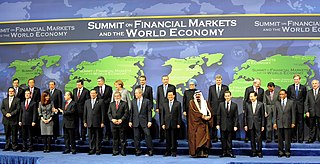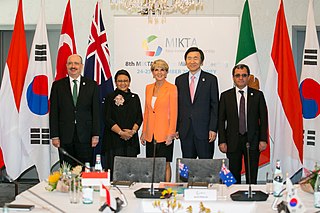
Singapore maintains diplomatic relations with 189 UN member states. The three exceptions are the Central African Republic, Monaco and South Sudan.

The United Nations Economic and Social Council (ECOSOC) is one of the six principal organs of the United Nations, responsible for coordinating the economic and social fields of the organization, specifically in regards to the fifteen specialized agencies, the eight functional commissions, and the five regional commissions under its jurisdiction.

The Group of Eight (G8) was an inter-governmental political forum from 1997 until 2014. It had formed from incorporating Russia into the Group of Seven, or G7, and returned to its previous name after Russia was expelled in 2014.

Asia-Pacific Economic Cooperation is an inter-governmental forum for 21 member economies in the Pacific Rim that promotes free trade throughout the Asia-Pacific region. Following the success of ASEAN's series of post-ministerial conferences launched in the mid-1980s, APEC started in 1989, in response to the growing interdependence of Asia-Pacific economies and the advent of regional trade blocs in other parts of the world; it aimed to establish new markets for agricultural products and raw materials beyond Europe. Headquartered in Singapore, APEC is recognized as one of the highest-level multilateral blocs and oldest forums in the Asia-Pacific region, and exerts significant global influence.

The Group of Seven (G7) is an intergovernmental political and economic forum consisting of Canada, France, Germany, Italy, Japan, the United Kingdom and the United States; additionally, the European Union (EU) is a "non-enumerated member". It is organized around shared values of pluralism, liberal democracy, and representative government. G7 members are the major IMF advanced economies.
The Doha Development Round or Doha Development Agenda (DDA) is the trade-negotiation round of the World Trade Organization (WTO) which commenced in November 2001 under then director-general Mike Moore. Its objective was to lower trade barriers around the world, and thus facilitate increased global trade.

The G20 or Group of 20 is an intergovernmental forum comprising 19 sovereign countries, the European Union (EU), and the African Union (AU). It works to address major issues related to the global economy, such as international financial stability, climate change mitigation and sustainable development.

The 2008 G20 Washington Summit on Financial Markets and the World Economy took place on November 14–15, 2008, in Washington, D.C., United States. It achieved general agreement amongst the G20 on how to cooperate in key areas so as to strengthen economic growth, deal with the 2008 financial crisis, and lay the foundation for reform to avoid similar crises in the future. The Summit resulted from an initiative by the French and European Union President, Nicolas Sarkozy, Australian Prime Minister Kevin Rudd, and the British Prime Minister, Gordon Brown. In connection with the G7 finance ministers on October 11, 2008, United States President George W. Bush stated that the next meeting of the G20 would be important in finding solutions to the economic crisis. Since many economists and politicians called for a new Bretton Woods system to overhaul the world's financial structure, the meeting has sometimes been described by the media as Bretton Woods II.

The 36th G8 summit was held in Muskoka, Ontario, Canada, on June 25–26, 2010. In this year's meeting, the G8 leaders agreed in reaffirming the group's essential and continuing role in international affairs and "assertions of new-found relevance". The form and function of the G8 was reevaluated as the G20 summits evolved into the premier forum for discussing, planning and monitoring international economic cooperation.
The Financial Stability Board (FSB) is an international body that monitors and makes recommendations about the global financial system. It was established in the 2009 G20 Pittsburgh Summit as a successor to the Financial Stability Forum (FSF). The Board includes all G20 major economies, FSF members, and the European Commission. Hosted and funded by the Bank for International Settlements, the board is based in Basel, Switzerland, and is established as a not-for-profit association under Swiss law.

The 2010 G20 Seoul Summit was the fifth meeting of the G20 heads of government/heads of state, to discuss the global financial system and the world economy, which took place in Seoul, the capital of South Korea, on November 11–12, 2010. South Korea was the first non-G8 nation to host a G20 leaders' summit.

The 2014 G20 Brisbane summit was the ninth meeting of the G20 heads of government/heads of state. It was held in Brisbane, the capital city of Queensland, Australia, on 15–16 November 2014. The hosting venue was the Brisbane Convention & Exhibition Centre at South Brisbane. The event was the largest ever peacetime police operation in Australia.

MIKTA is an informal middle power partnership between Mexico, Indonesia, South Korea, Turkey, and Australia. It is led by the Foreign Ministers. It was created in 2013 on the sidelines of the United Nations General Assembly in New York City and aims to support effective global governance.

The 2015 G20 Antalya summit was the tenth annual meeting of the G20 heads of government/heads of state. It was held in Belek, Antalya Province, Turkey on 15–16 November 2015. The venue for the Leaders Summit was Regnum Carya Hotel Convention Centre at the Regnum Carya Golf & Resort Spa.

The Quint is an informal decision-making group consisting of the United States and the Big Four of Western Europe. All the countries forming it are allies and members of NATO, the OECD and the G7/G20.

The 2017 G20 Hamburg summit was the twelfth meeting of the Group of Twenty (G20), which was held on 7–8 July 2017, at Hamburg Messe, in the city of Hamburg, Germany.

The 2020 G20 Riyadh summit was the fifteenth meeting of the Group of Twenty (G20). It was scheduled to take place in Riyadh, the capital city of Saudi Arabia, on 21–22 November 2020. However, due to the COVID-19 pandemic, it was held virtually.

The 18th Summit of the Non-Aligned Movement was held October 25–26, 2019 in Baku, Azerbaijan. The summit was attended by the delegation from more than 120 countries.

The Non-Aligned Movement (NAM) is a forum of 120 countries that are not formally aligned with or against any major power bloc. It was founded with the view to advancing interests of developing countries in the context of Cold War confrontation. After the United Nations, it is the largest grouping of states worldwide.

















